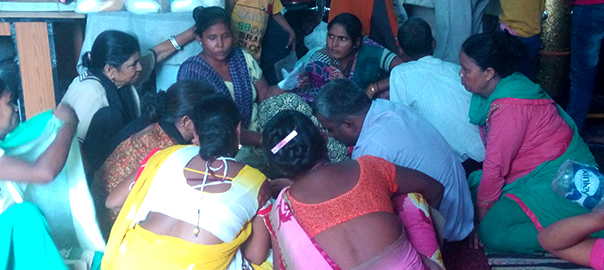The life and development of self-help groups is, in many ways, similar to those of a mango tree. You plant a small seed in the soil, water it, nurture it, and faithfully attend to the sapling with the hope of getting delicious fruit in a few years. Not that it doesn’t give shade and beauty and purpose along the way, but the real benefit waits down the road.
Rahham’s first church-based self-help groups (SHG) were started in late 2016 right in the communities of the members: in the slums. When you think of these meetings, try to picture 10-20 people sitting together on the floor in a small room, 90% of them are women, almost all are illiterate, most are widows, many are HIV-infected, the ones who are married often have alcoholic or drug-addicted husbands. It’s not your average church meeting with muffins, coffee, and a PowerPoint.
The longer I live in India, the more I understand that the way I naturally see the world can be so radically different from someone else who grew up under completely different circumstances with different logic, beliefs, teachings, worldview, and economics. To see why the SHGs are such a necessary and relevant idea, we have to grasp what life is like for people in these slums. It is very difficult for people on the bottom of the caste system to get out of systemically perpetuated poverty. Most people are uneducated and untrained, therefore not able to find jobs that provide enough. Often there is no family support or any kind of social net around the individual or family, because most of them are migrants in this city, having left behind small villages far away in hopes of better work opportunities. Generally there is no sewage system, no toilets, no infrastructure in these slums, so health issues are constant, which causes even more hardship. It is easy to see that in this kind of pervasive poverty hopelessness would be deep and addictions rampant.
The major expenses of families here are rent and health-care. When a man or woman is hospitalized, they commonly lose their job. This means that hospital bills and unpaid rent accumulate, so eventually the family will have no choice but to get a loan from a moneylender in the community. And because these interest rates are terrible (up to 30%), they will keep paying this loan back for years to come, hoping just to stay afloat.
Understanding these stark realities, the self-help groups were set up by the Rahham team with two major goals in mind: to achieve financial freedom from moneylenders and for members to discuss and find solutions to the community’s problems. The groups are led by church members, but are open to anyone from the immediate community who commits to the understanding and requirements of the group. These meetings provide great opportunities for Hindu or Muslim members to be exposed to biblical values.
Members of the group decide how often and when to meet and what to discuss. They use a money box for the savings, and each member puts in the same amount every month, typically 100-200 rupees (roughly $1.50-$3.00). As these savings grow, members can request to take a loan from the group. As opposed to the moneylenders, the group only charges 1% interest, mostly as a motivation. This is a fantastic alternative! The person requesting money needs to explain the reason for the loan, and two others have to vouch for her. So far the seven self-help groups have saved a total of around $2,100 and have given 26 loans, which were paid back with the exception of two. To think of how much discipline, commitment, faith, interdependence, communication, and hard work this required makes my heart rejoice!
Besides helping financially, the meetings provide a platform for people from the same neighborhood to talk about pressing community and personal concerns, like widowhood, HIV, education, their children’s future, or addiction. Previously, there were no places or opportunities for such discussions, especially for wives. Sharing about common worries and questions assures the women that they are not alone in their struggles. The Rahham team also teaches the groups on topics related to hygiene, health, priorities, financial stewardship, or parenting.
One women’s group, suffering the manifold affects of their husbands’ alcoholism, decided to pray together about a local liquor shop where the men spent all their time and money. The year they started praying, the police came twice to raid that shop from all illegal alcohol, something that had not happened for 20 years! Experiences like this encourage the groups and motivate them to stand alongside one another in prayer.
It is amazing to me that from our very different lives and very different homes we can join these women and men in their battles for freedom from loans, addictions, serious health issues, untimely deaths, hopelessness, and physical and spiritual poverty. Let’s be faithful to pray.



Leave A Comment